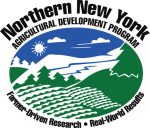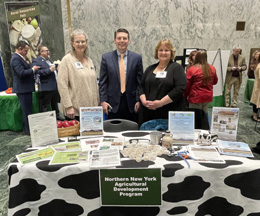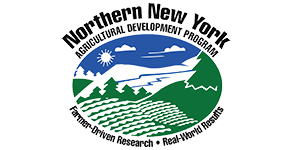 The Northern New York Agricultural Development Program (NNYADP) has received $300,000 in the 2024-2025 New York State Budget. State funding makes possible high-priority projects selected by the farmer-driven agricultural research program for New York’s northern-climate region that includes Clinton, Essex, Franklin, Jefferson, Lewis and St. Lawrence counties.
The Northern New York Agricultural Development Program (NNYADP) has received $300,000 in the 2024-2025 New York State Budget. State funding makes possible high-priority projects selected by the farmer-driven agricultural research program for New York’s northern-climate region that includes Clinton, Essex, Franklin, Jefferson, Lewis and St. Lawrence counties.
NNYADP project results are helping farms to continually adapt to such challenges as weather extremes and emerging crop and livestock pests and diseases, and to meet opportunities to grow such sectors as northern New York’s maple industry and local foods production.
Funding for the NNYADP is supported by the New York State Legislature through the New York State Assembly and administrated by the New York State Department of Agriculture and Markets. New York State Assembly Members Billy Jones and Ken Blankenbush serve on the NYS Assembly Agriculture Committee chaired by Assemblymember Donna Lupardo.
NYS Assembly Agriculture Committee Chair Donna Lupardo said, “The Northern New York Agricultural Development Program (NNYADP) is a statewide leader, providing quality research and technical assistance to farmers in the North Country. They are exceptional stewards of the resources they receive, providing practical solutions to challenges farmers are facing across the state. I’d like to acknowledge and thank all my Assembly Agriculture Committee colleagues, and recognize Assembly Members Billy Jones and Ken Blankenbush for their strong advocacy on behalf of the NNYADP.”
NYS Assemblyman Billy Jones said, “I am proud to have secured funding for the Northern New York Agricultural Development Program in this year’s budget to help North Country farmers conduct groundbreaking research. As we continue to experience warmer seasons and extreme weather, this research helps local farmers identify crops and innovative methods to help make the most of our short growing season. This is funding I have delivered to our region every year since I was elected, and I will always support our North Country farmers. I look forward to continuing to support this vital program and learning more about their important research.”
NYS Assemblyman Ken Blankenbush said, “In Jefferson, St. Lawrence, and Lewis counties we rely on agricultural cultivation as a primary source of economic activity. The inclusion in the State budget of $300,000 for the Northern New York Agricultural Development Program will create massive agricultural improvements across all of these counties. This investment will allow farms to be ready to combat issues when they emerge and to transform the North Country into the farming capital of New York state.”
NNYADP Co-Chair Joseph Giroux said, “The farmers of northern New York recognize our responsibility to meet the mission for which the New York State Legislature established the Northern New York Agricultural Development Program – to develop the region’s unique natural potential to be a farm-based economic powerhouse for the State. We are grateful for the leadership of Assemblyman Billy Jones and the support of his Assembly colleagues and fellow northern New York legislative representatives to continue this mission in 2024.”
Giroux serves as Co-Chair of the NNYADP program with Jon Greenwood of Canton and Jon Rulfs of Peru, NY. The results of the NNYADP’s 2023 projects are posted online at https://www.nnyagdev.org.

 In 2023, the NNYADP funded research by Quirine Ketterings, Ph.D., director of the Cornell Nutrient Management Spear Program, focused on assessing the relationship between whole farm nitrogen balances and whole-farm nitrous oxide emissions to help identify key drivers of the balances and greenhouse gas emissions. Click here to read her report:
In 2023, the NNYADP funded research by Quirine Ketterings, Ph.D., director of the Cornell Nutrient Management Spear Program, focused on assessing the relationship between whole farm nitrogen balances and whole-farm nitrous oxide emissions to help identify key drivers of the balances and greenhouse gas emissions. Click here to read her report: